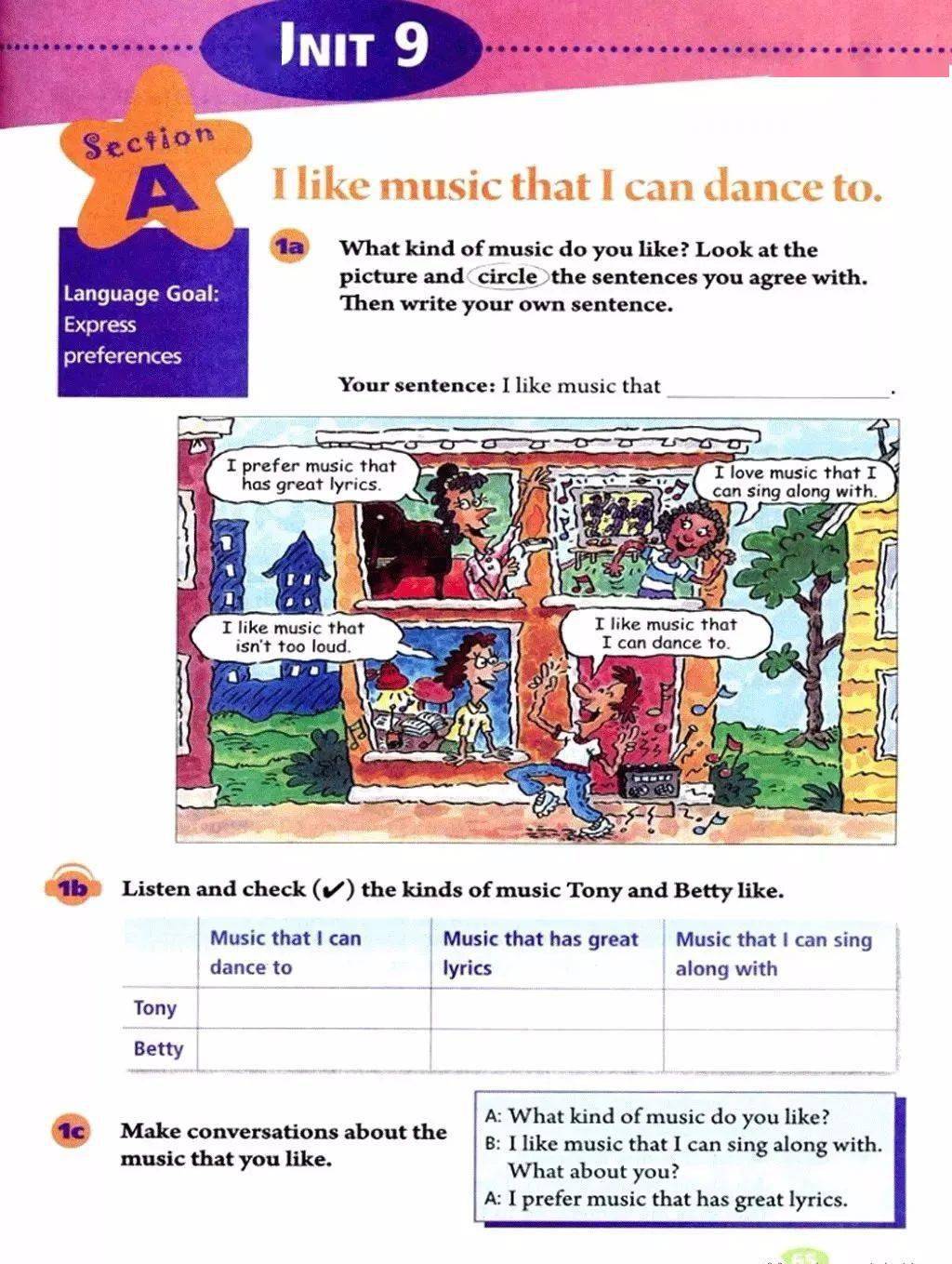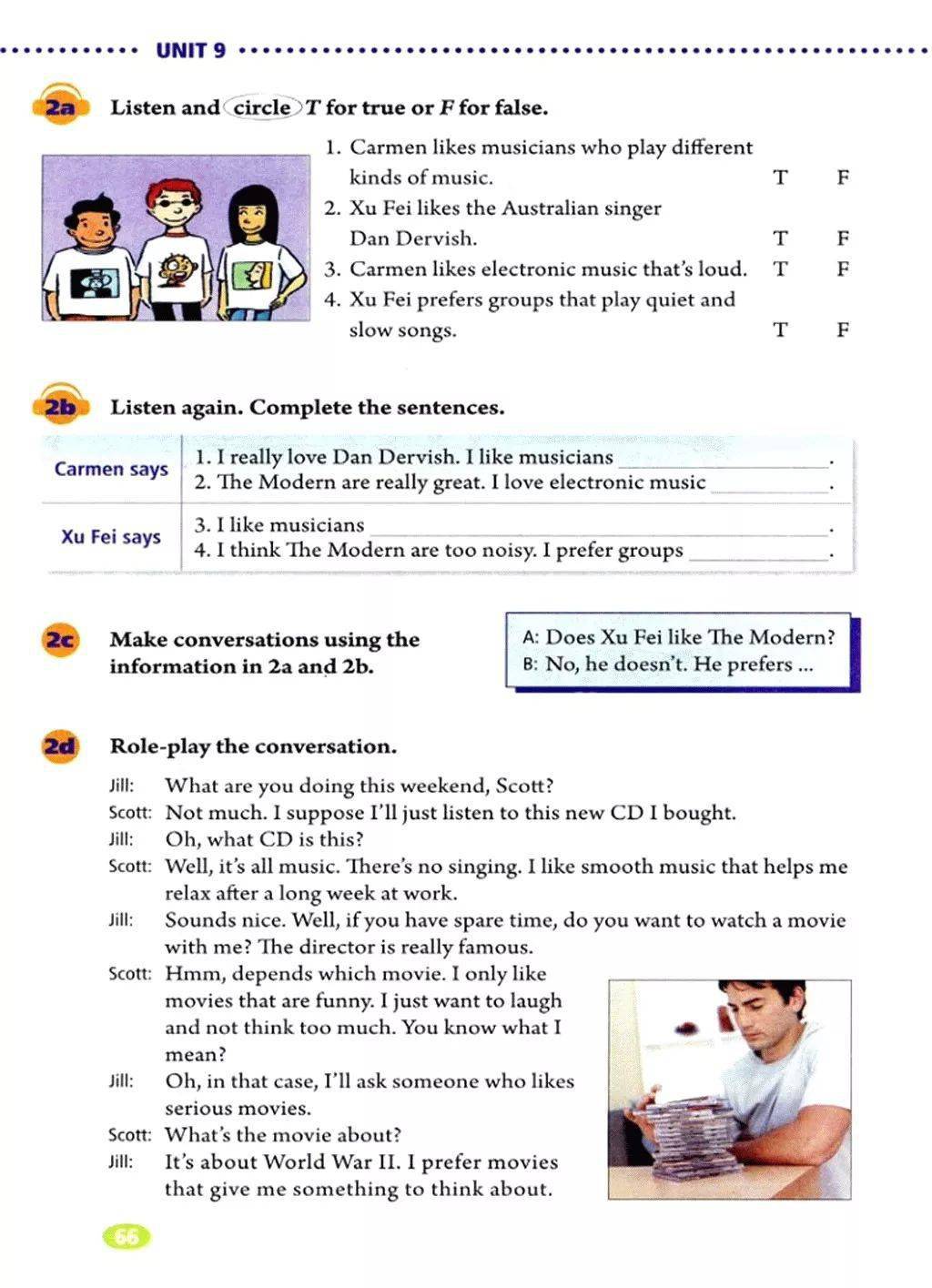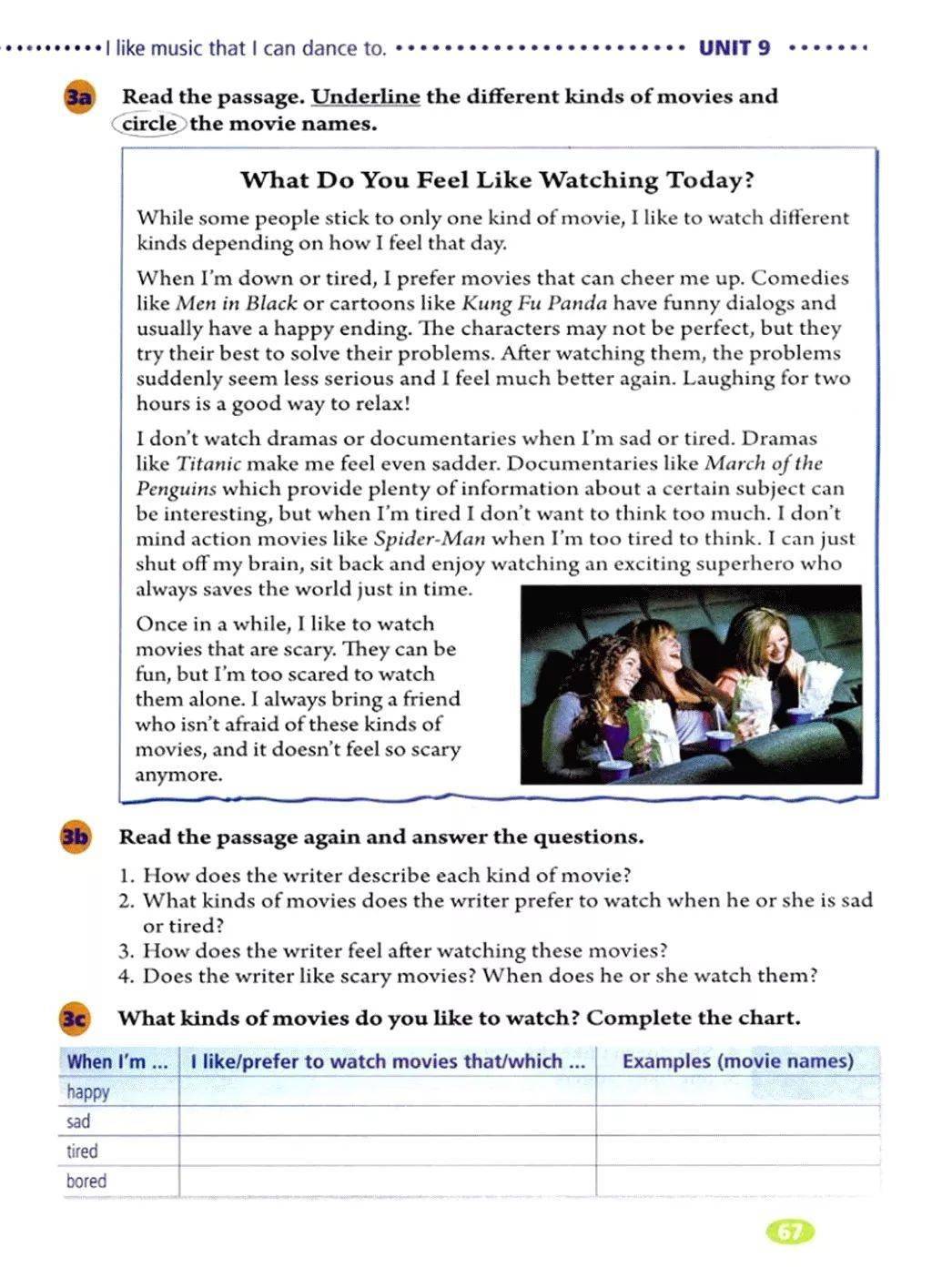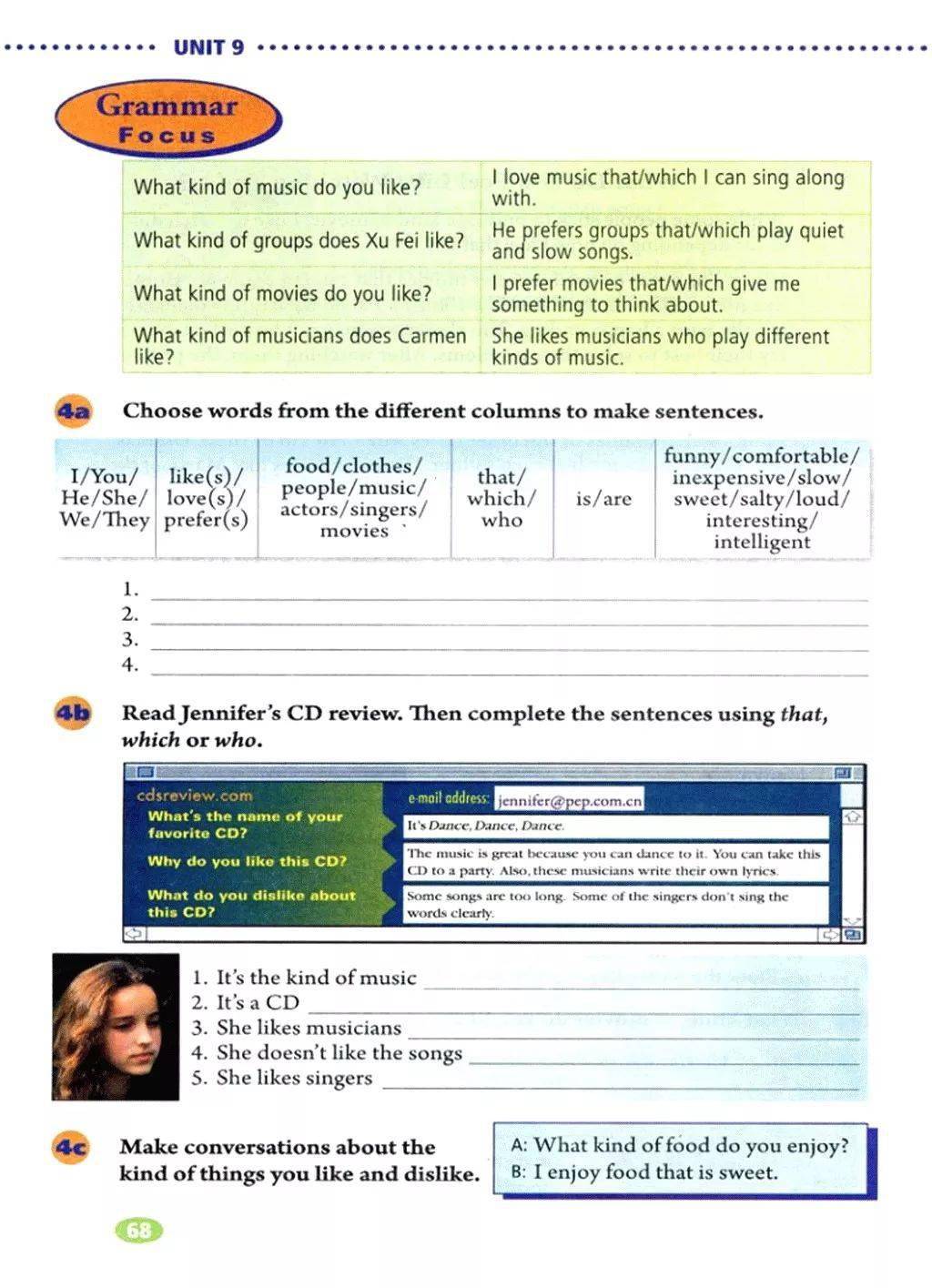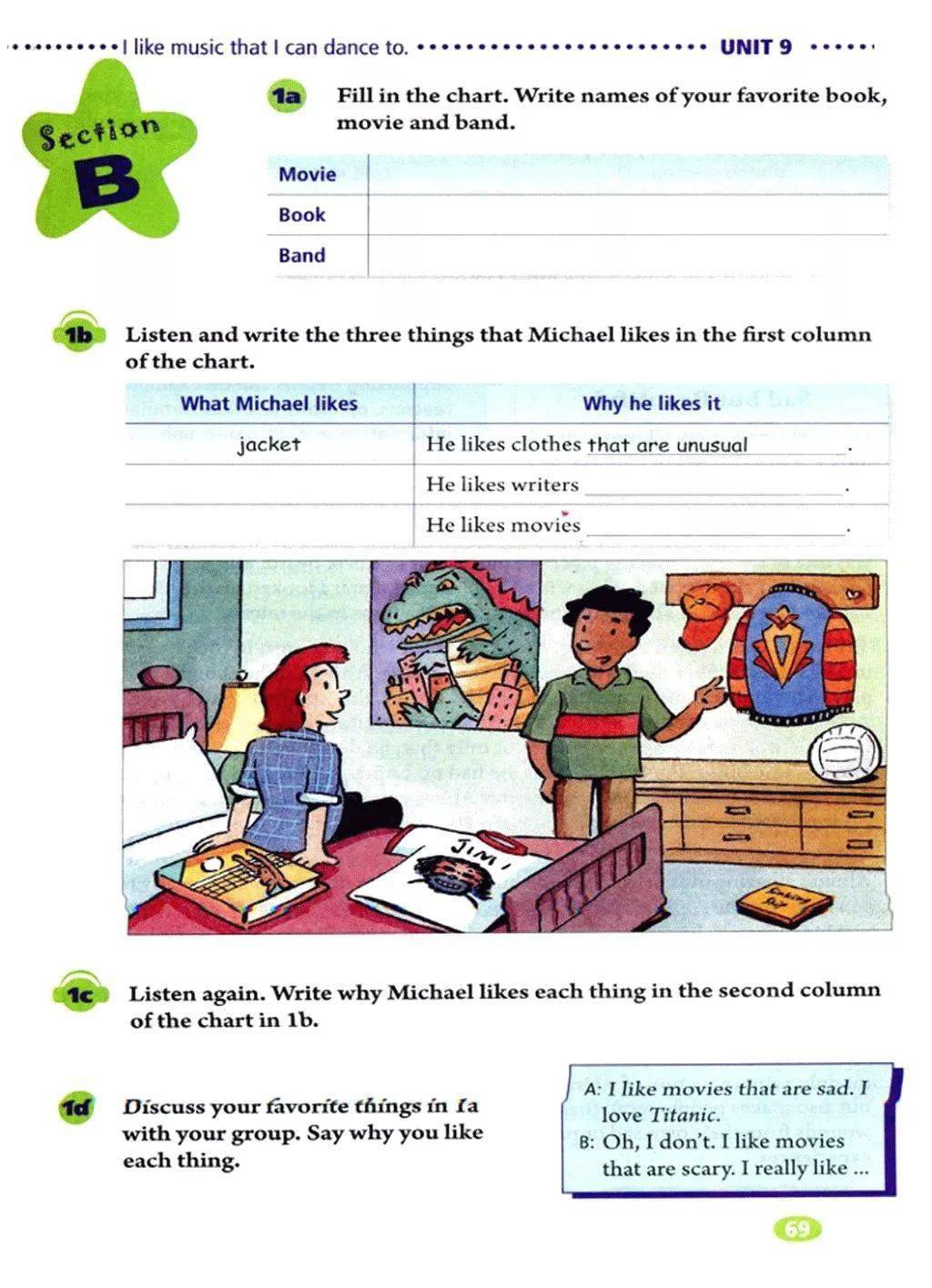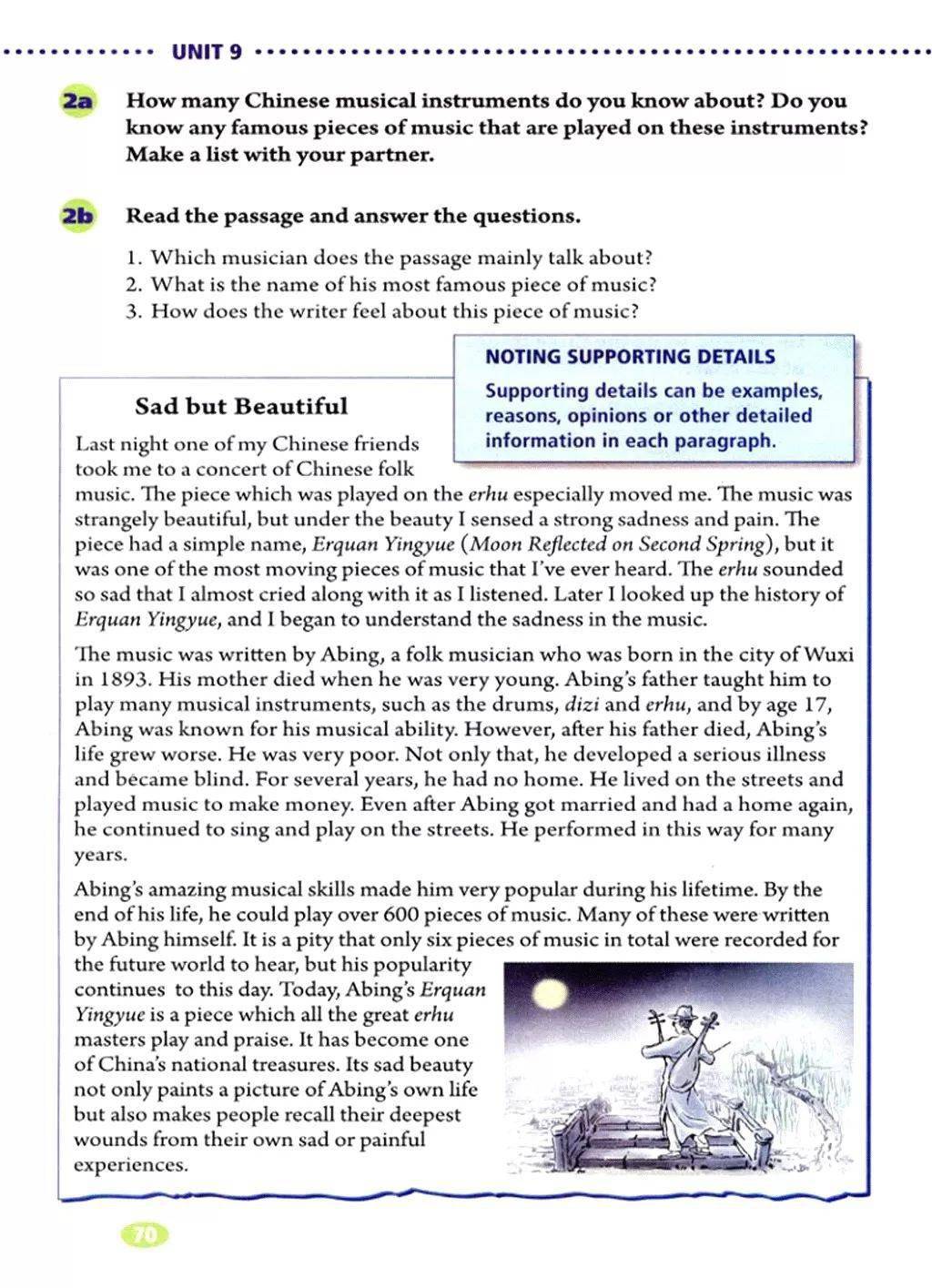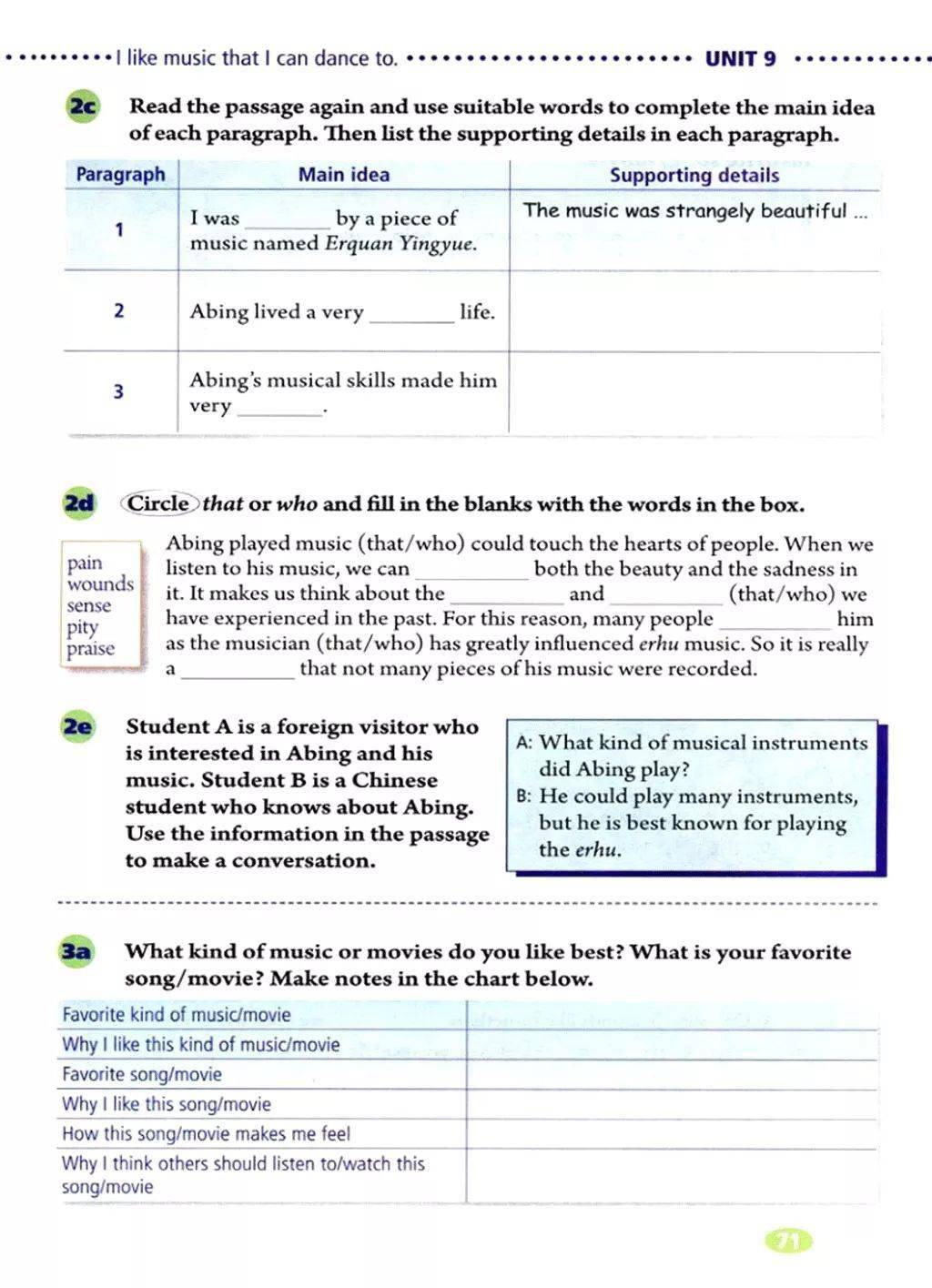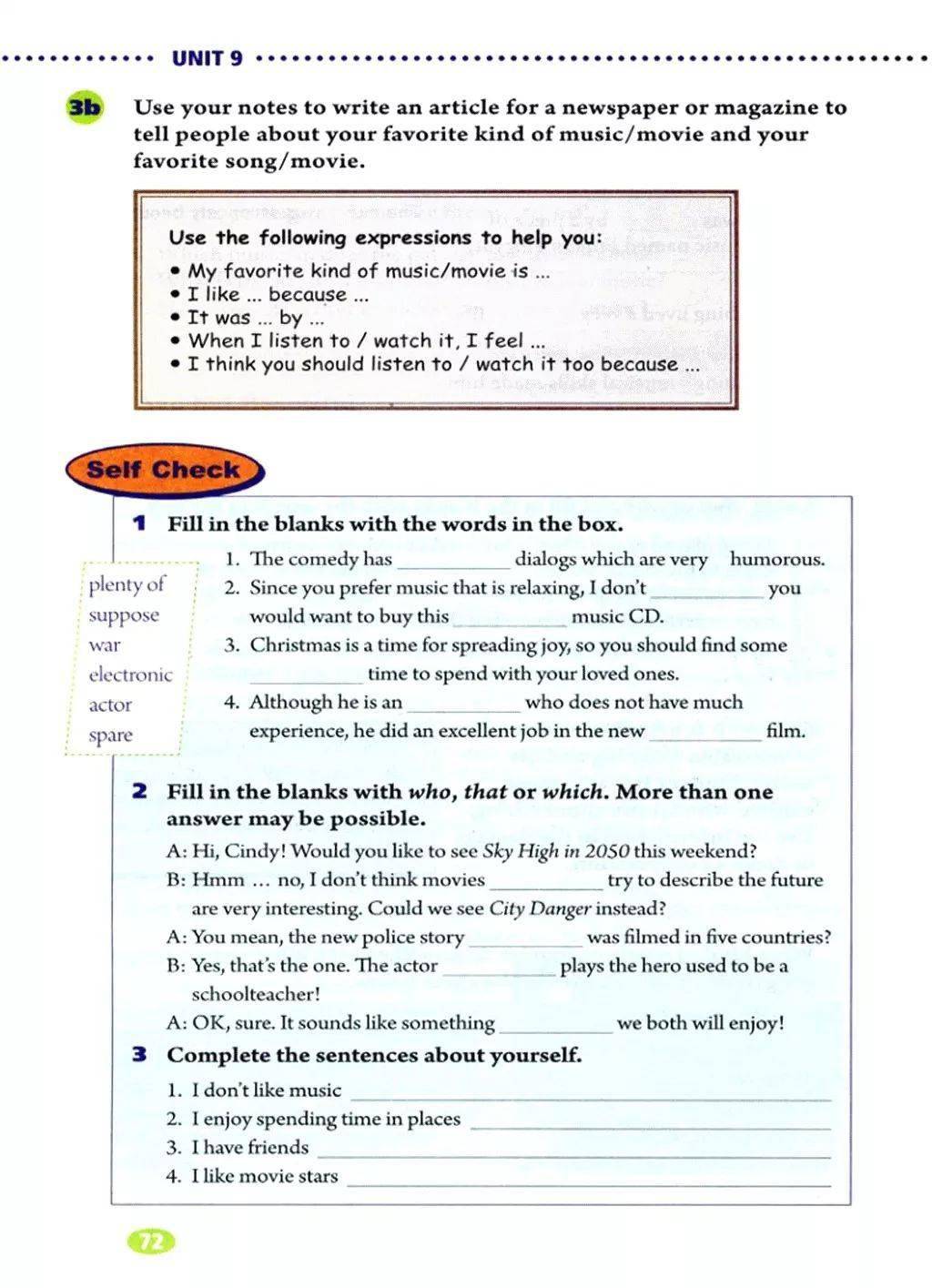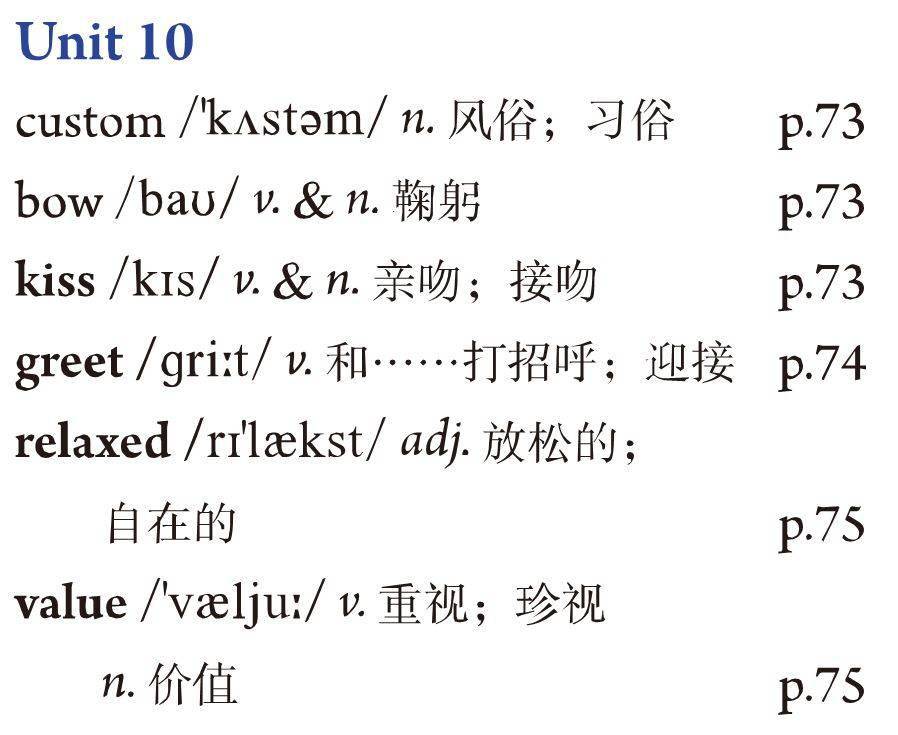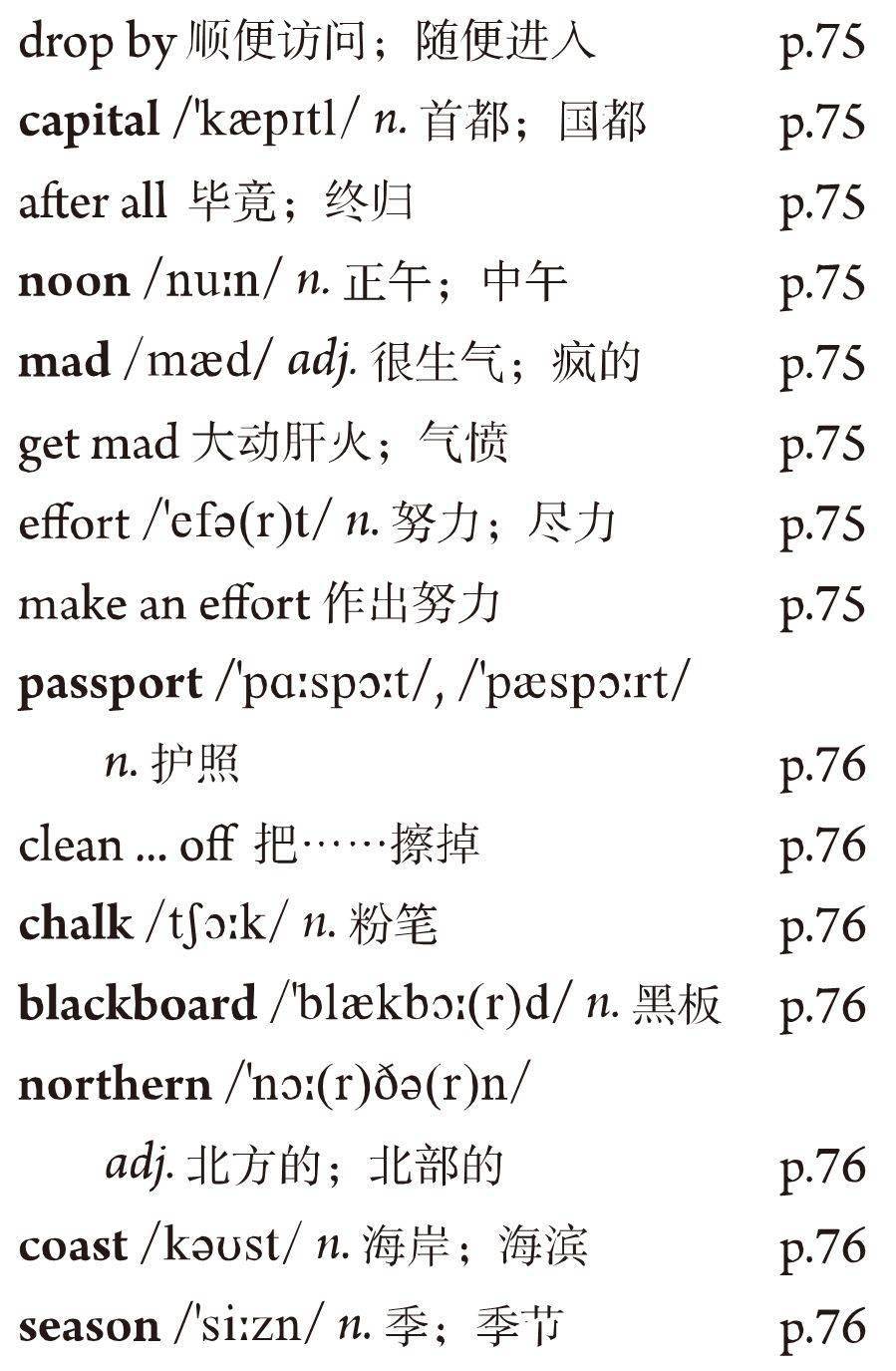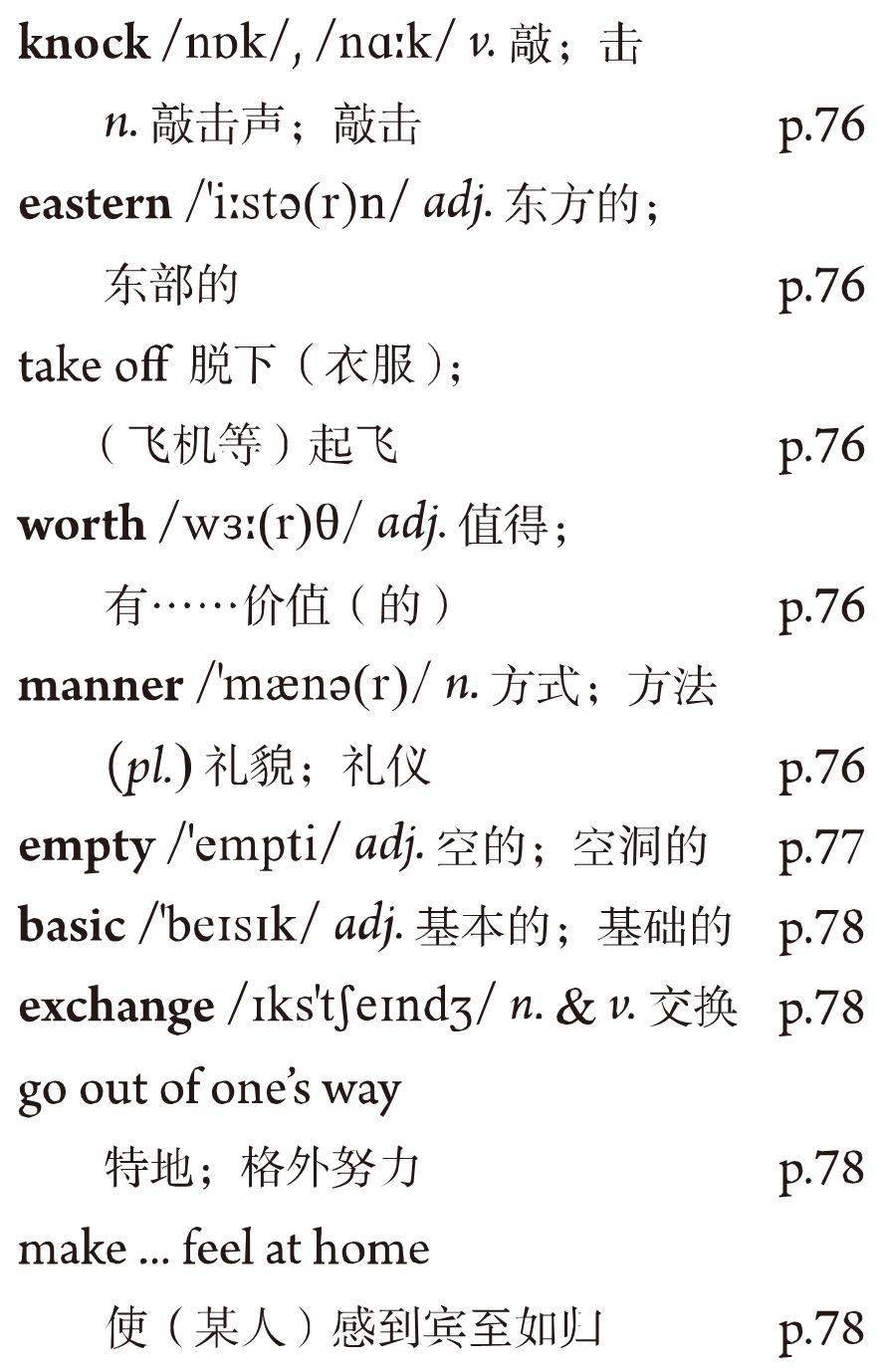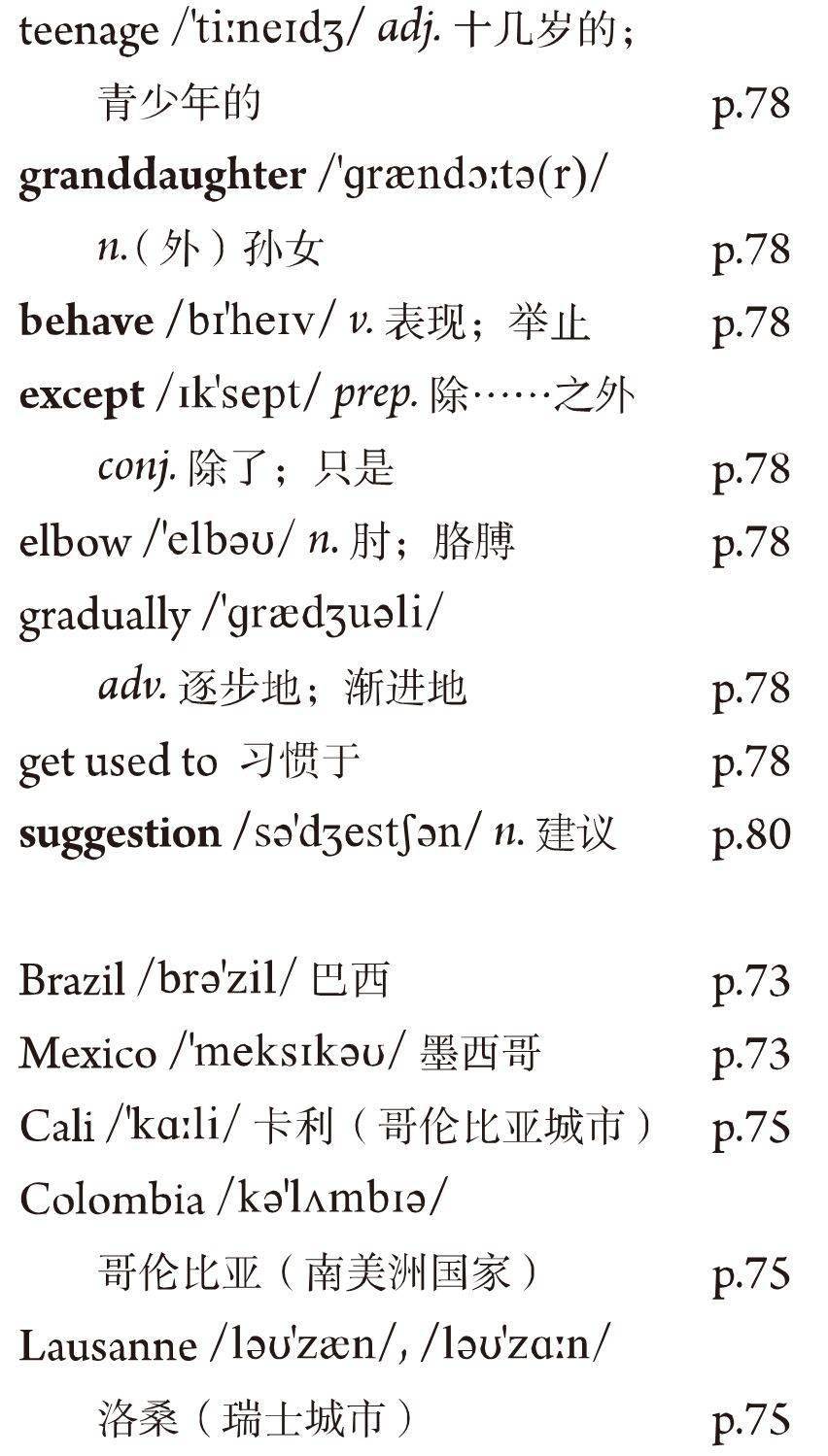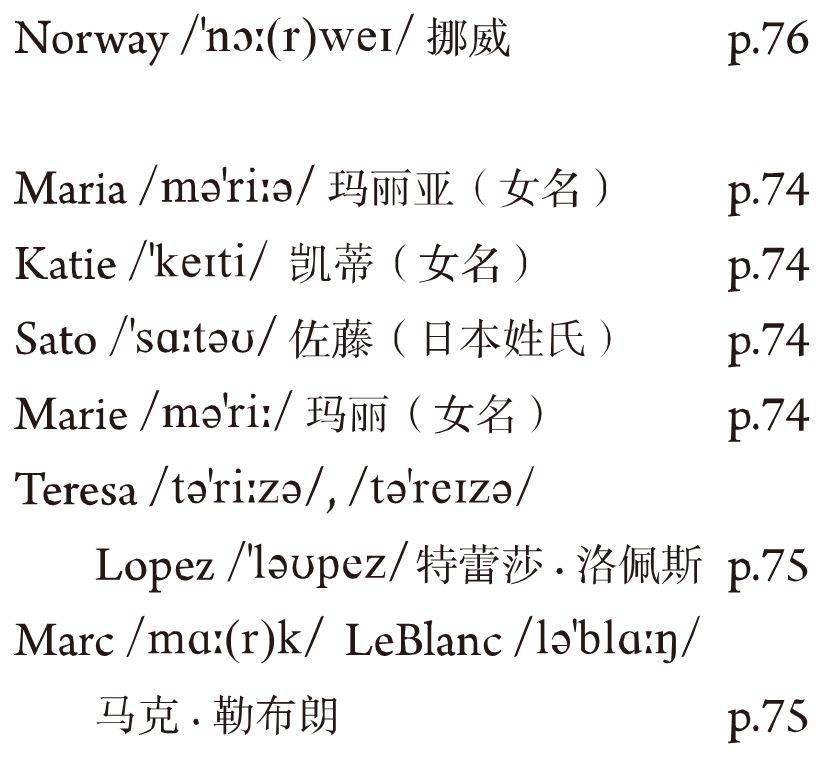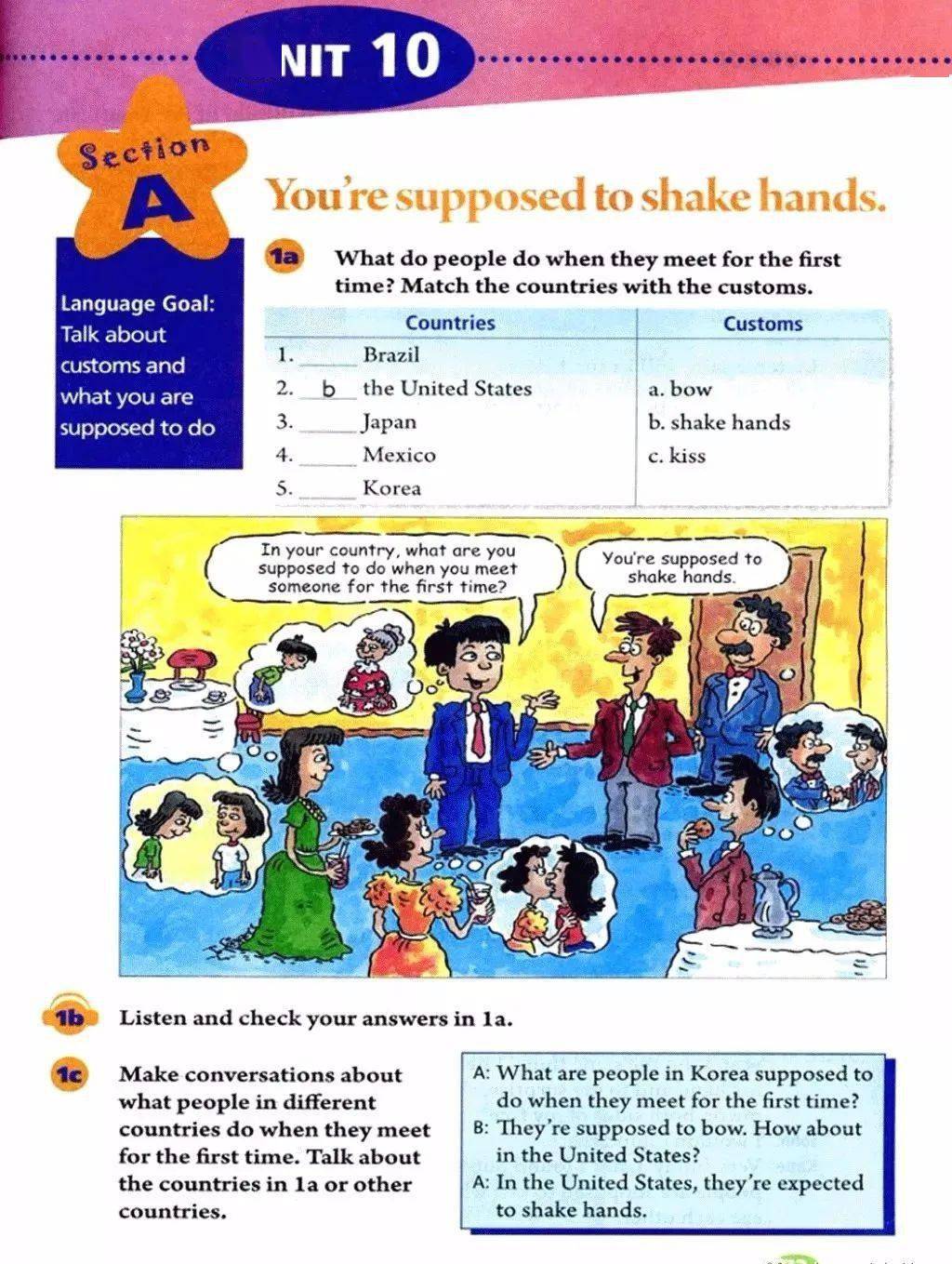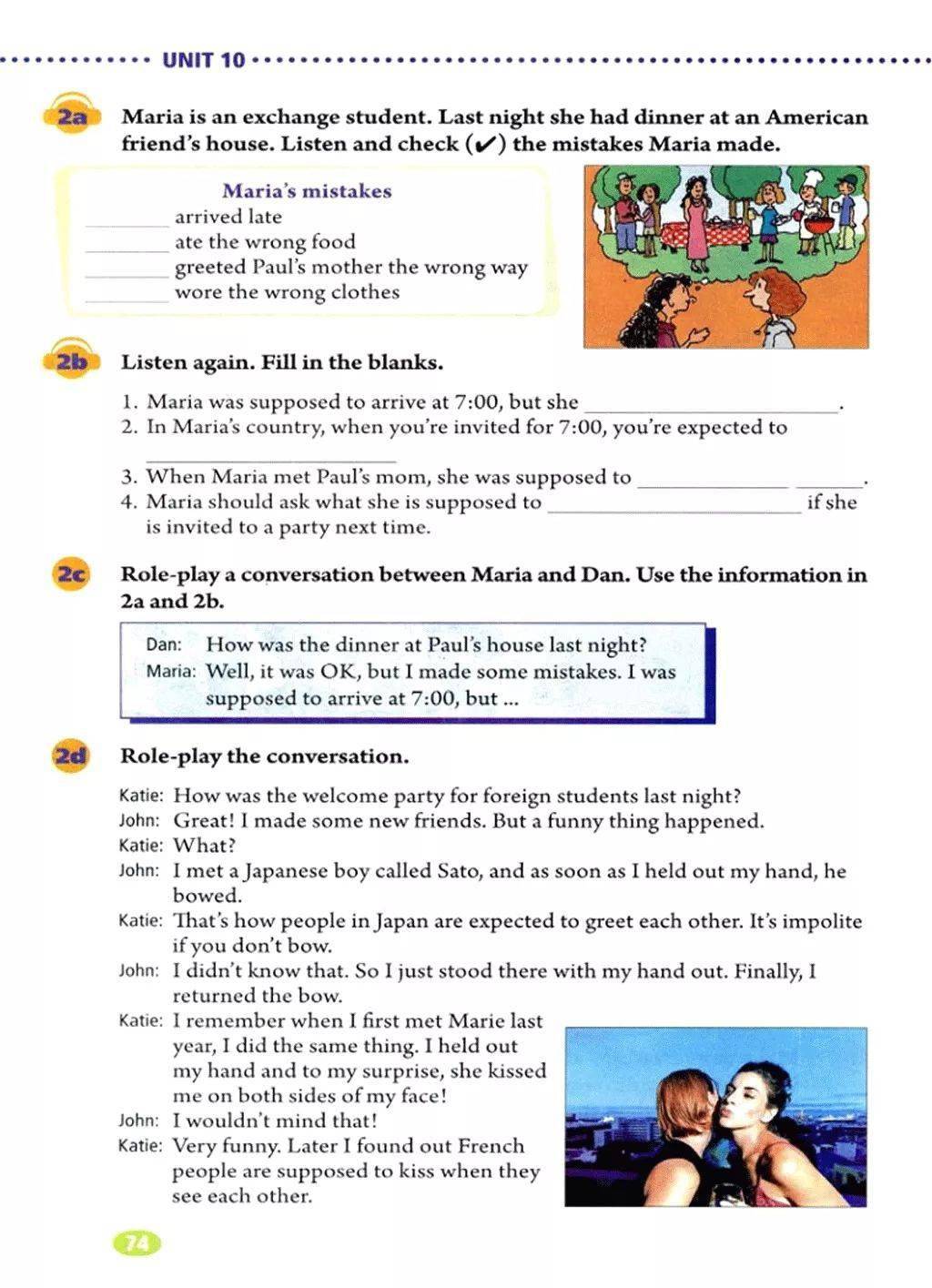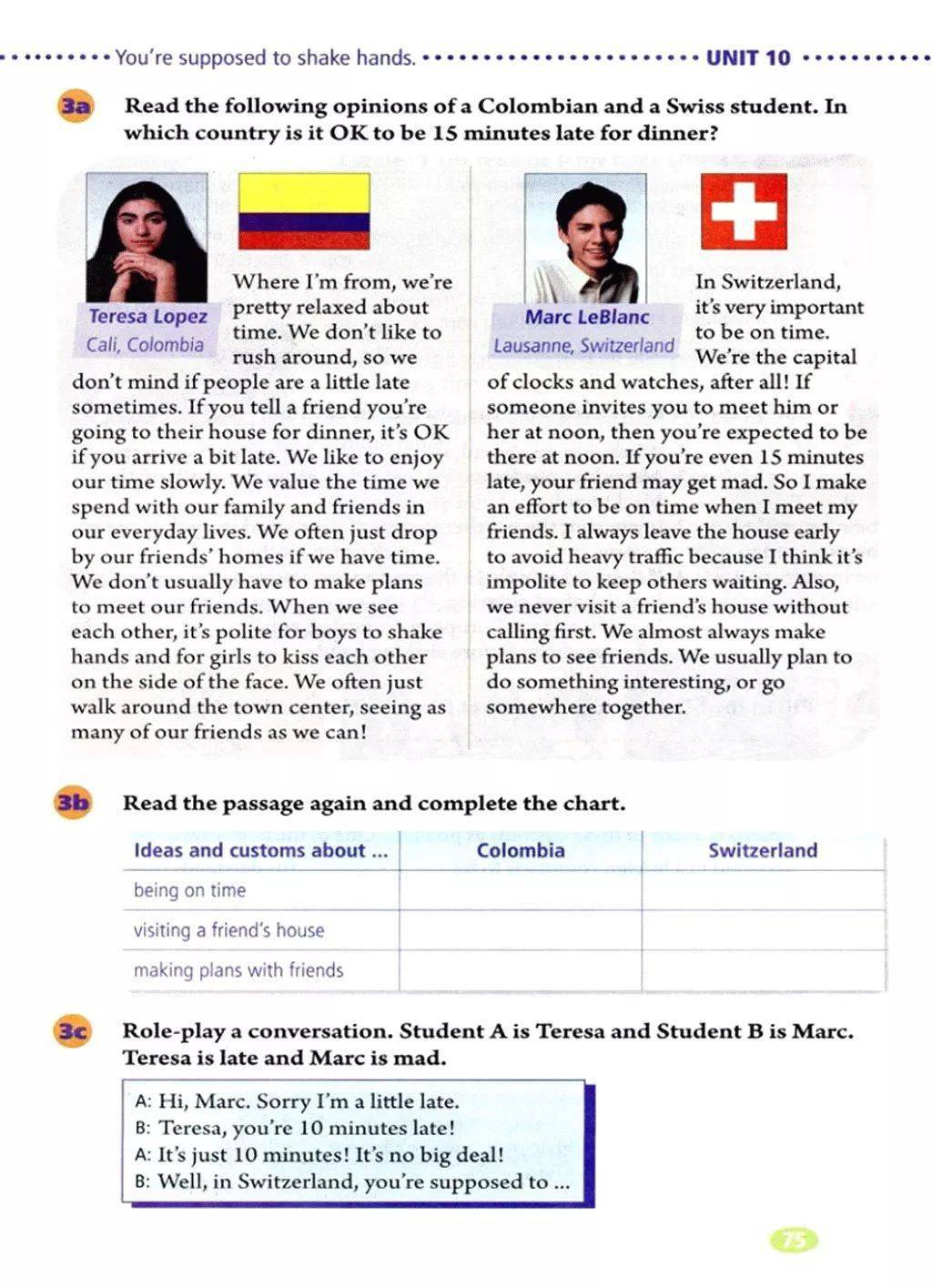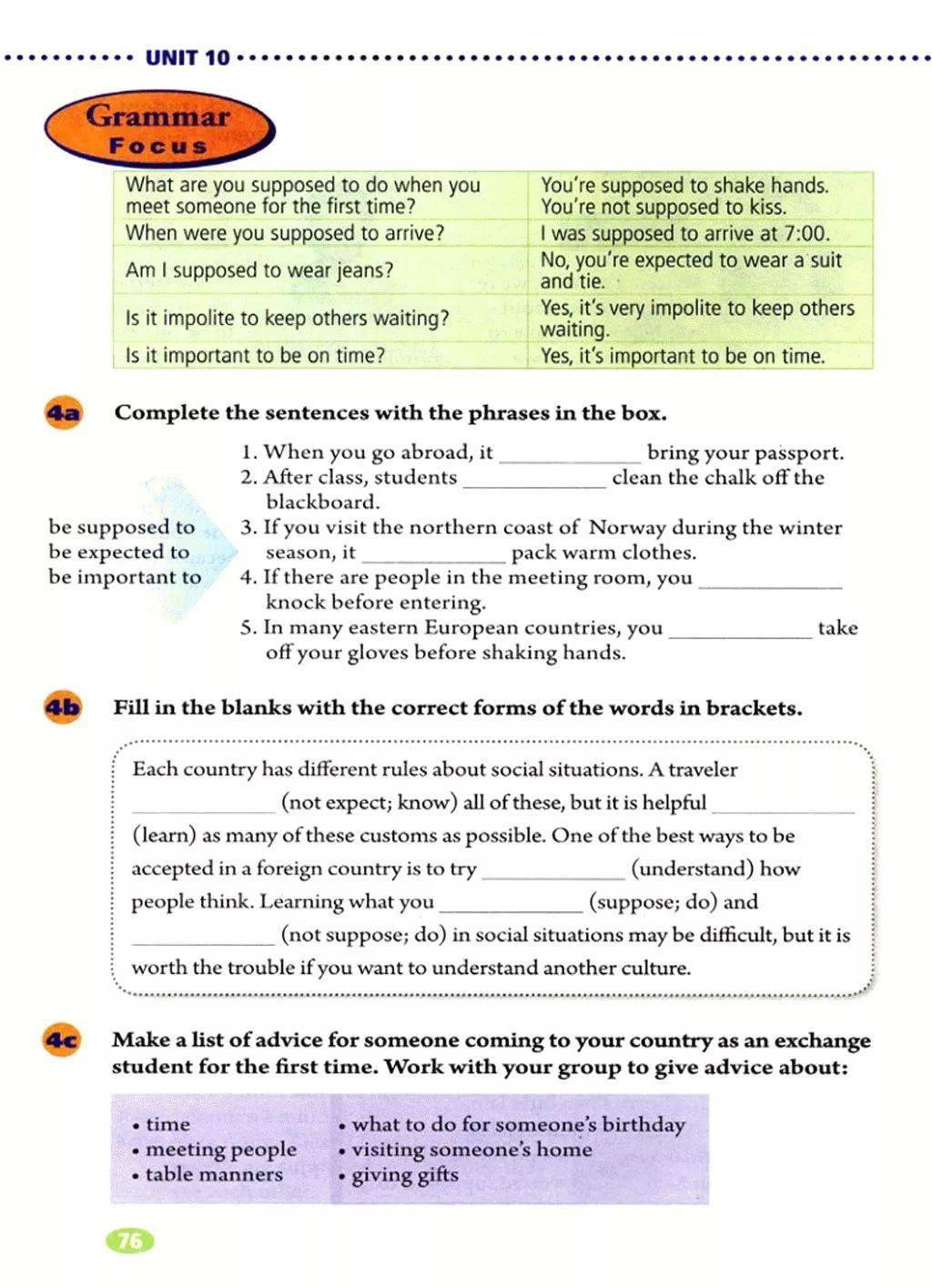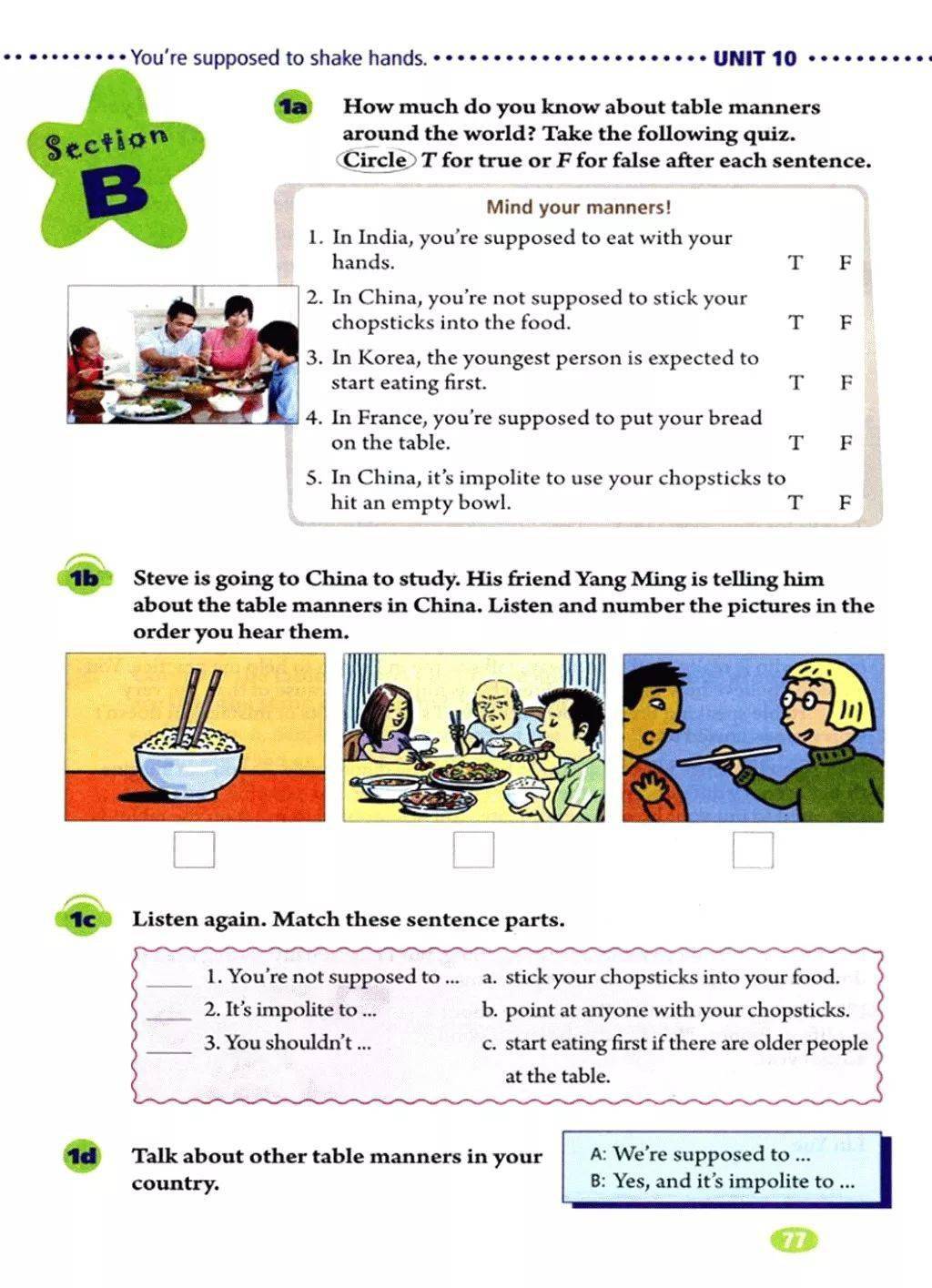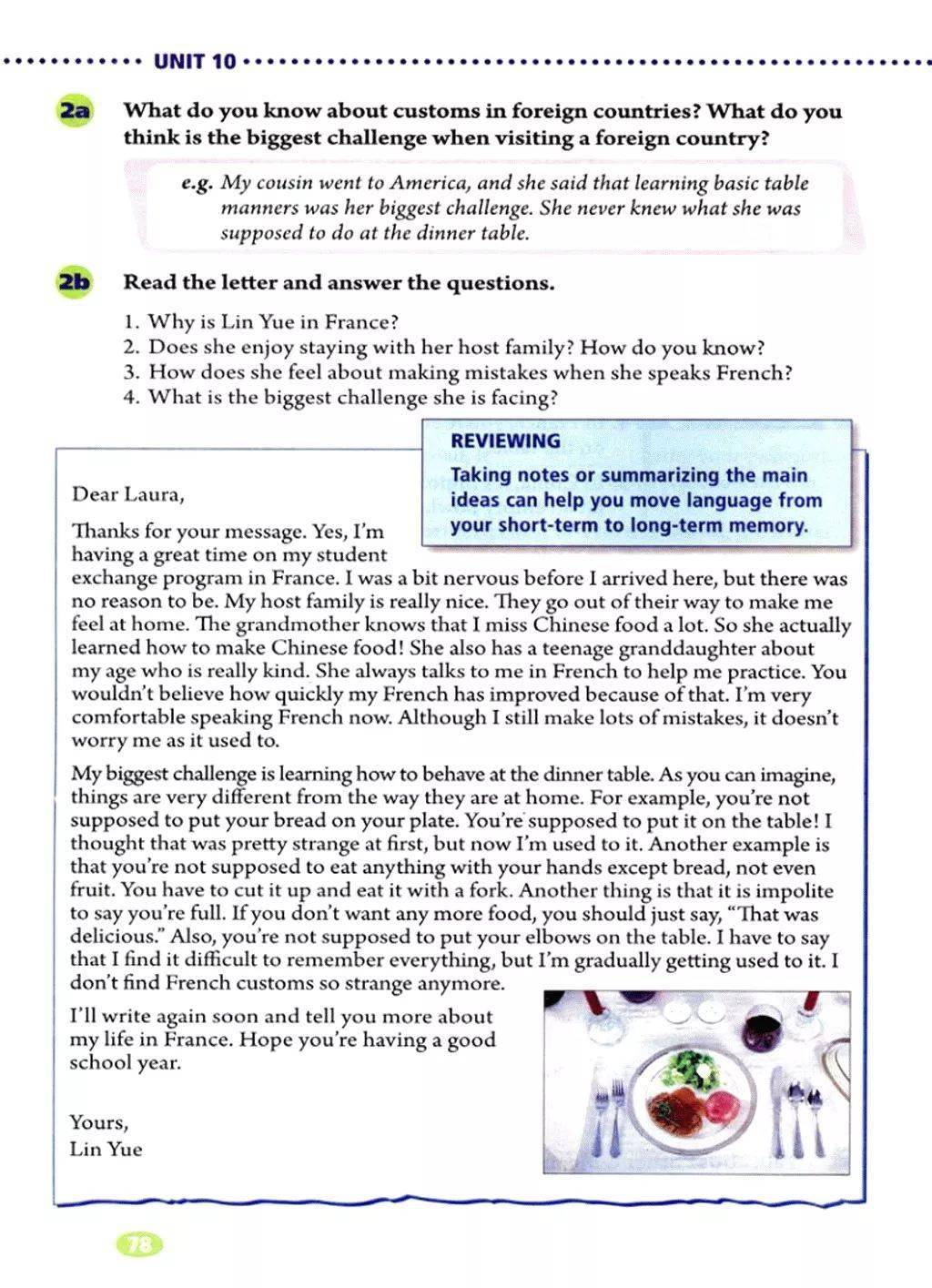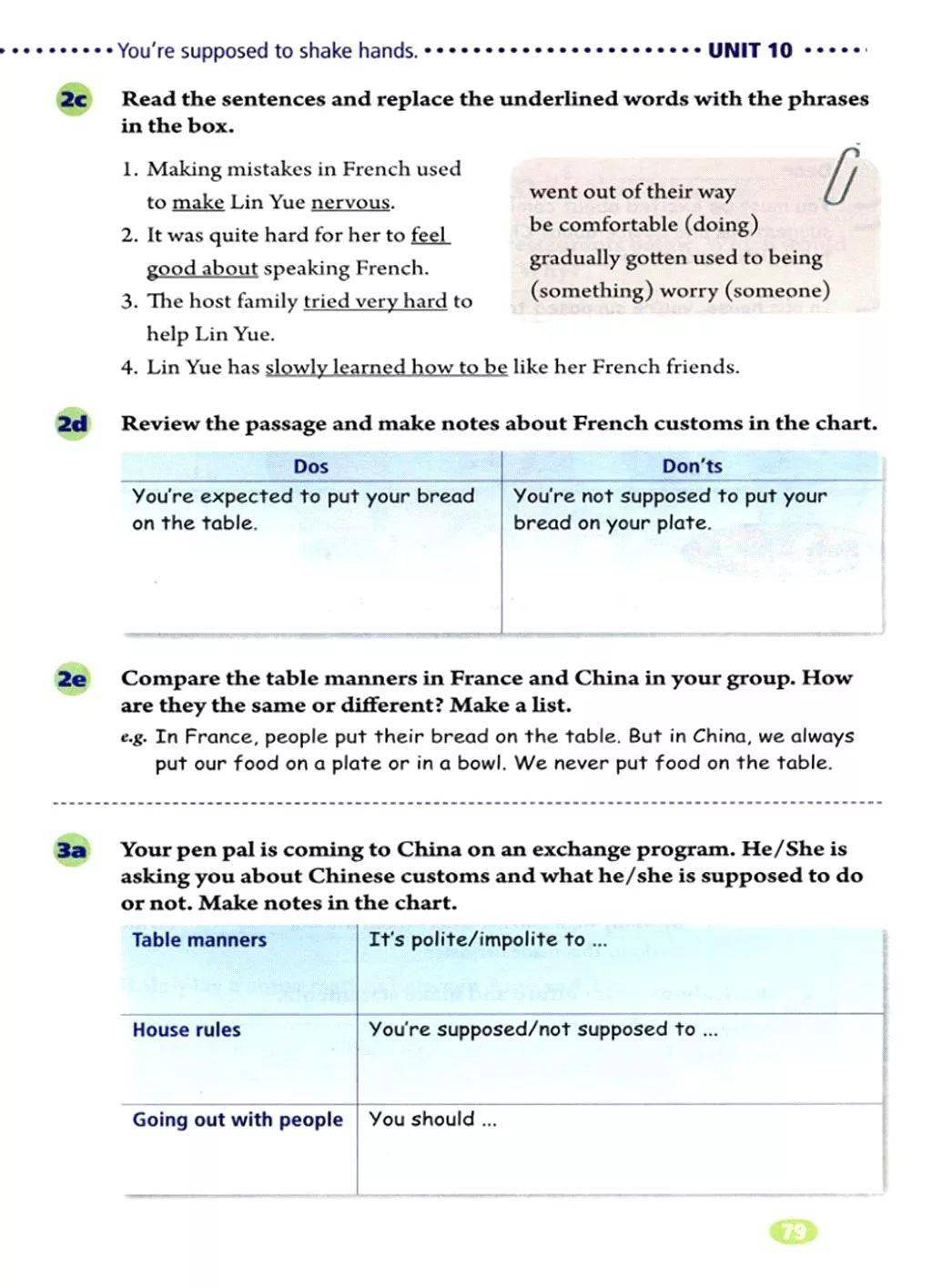人教版英语九年级Unit1 |
您所在的位置:网站首页 › 英语课文梳理 › 人教版英语九年级Unit1 |
人教版英语九年级Unit1
|
▲点右上方绿标即可收听
03 Unit9知识梳理 【重点短语】 1. dance to (music) 随着(音乐)跳舞 2. sing along with 随着…一起唱 3. musicians who play different kinds of music 弹奏不同类型音乐的音乐家 4. electronic music 电子音乐 5. not much 没什么(事) 6. suppose sb to do sth. 猜想某人做某事 7. be supposed to do sth 应该做某事 8. suppose sb (to be) +adj. 原以为… 9. have spare time 有空闲时间 10. in one’s spare time在某人的空闲时间 11. spare the time to do sth 抽时间做… 12. a film director 一名电影导演 13. think too much 想太多 14. in that case 既然那样 15. World War II 第二次世界大战 16. smooth music 悦耳的音乐 17. prefer A to B 比起B来更喜欢A 18. prefer doing A to doing B 19. prefer to do sth. rather than do sth. 20. feel like doing sth 想要做某事 21. stick to 坚持,固守 22. be down 悲哀,沮丧 23. cheer sb up 使… 高兴/ 振奋 24. have a happy ending 有个美满的结局 25. try one’s best to do sth. 尽某人最大努力做… 26. less serious 不那么严重 27. a good way to do sth 做某事的好办法 28. make me feel even sadder 让我感觉更伤心 29. provide plenty of information about a certain subject 提供了大量的关于某个主题的信息 30. shut off my brain 关闭我的大脑 【重点句型】 1. I love singers who write their own music. 我喜欢自己创作曲子的歌手。 2. We prefer music that has great lyrics. 我们更喜欢歌词很棒的曲子。 3. What do you dislike about this CD. 你不喜欢这张CD的什么? 4. What does it remind you of? 它使你想起了什么? 5. The music reminds me of Brazilian dance music. 这首曲子使我想起了巴西舞曲。 6. It does have a few good features, though. 然而,它的确也有一些好的方面。 7. She really has something for everyone. 每个人的确都能从她的作品中领悟到一些东西。 8. Whatever you do, don’t miss this exhibition. 无论怎样,你都不能错过这次展出。 9. As the name suggests, the band has a lot of energy. 正如乐队名字所暗示的那样, 这支乐队很有活力。 10. Some people say they are boring, but others say they are great. 有些人说他们很无聊,但也有人说,他们是伟大的。 11.I f I were you, I’d eat nuts instead. 如果我是你,我会改吃坚果。 04 词汇精讲 1. along with along with是介词短语,意为“连同……一起”,与together with同义。如果句子的主语为单数,后接 along with等介词短语时,谓语用单数。例如: He sent the books along with other things. 我把一些书和其他东西一起寄走了。 The apple,along with some grapes,has gone bad. 苹果,还有葡萄,都变质了。 【拓展】 单数主语即使后面带有由with, along with, together with, like, but, except, besides, as wellas, more than, no less than, rather than等引导的短语,谓语动词仍用单数。例如: Air as well as water is matter. 空气和水都是物质。 My friend said everyone except Tom and Jim was there then. 我的朋友说那时除了汤姆和吉姆大家都在那儿。 2. prefer (1)prefer是及物动词,意思是“更喜欢、比较喜欢”,相当于like better。例如: Which do you prefer(=like better),rice or bread? 你比较喜欢哪一样,米饭还是面包? (2)由prefer构成的短语: 1)preferA to B意为“喜欢A胜过B、比起B来更喜欢A”,此短语中A和B的形式一样,可以是名词、代词或者动名词,但必须两个词形式统一。例如: We prefer apples to oranges. 比起桔子来我们更喜欢苹果。 My grandma prefers taking a walk to sitting in front of the TV. 我奶奶宁愿去散步而不愿看电视。 2)prefer to do something rather than do something 宁愿做某事,而不愿意做某事.此短语中prefer 的后面用动词不定式,than的后面用省略to的动词不定式。例如: They prefer to stay at home and watch TV, rather than go out for a walk. 他们宁愿呆在家里看电视,也不愿意出去散步。 3. too many &toomuch (1)too many 意为“太多,大量的”,后跟可数名词复数。例如: There are too many books in theroom. You can choose any one to read. 房间里有太多的书了,你可以选择任何一本来读。 The boy has too many questions toask. 那个男孩有太多的问题要问。 (2)too much作形容词,意为“许多,大量”,后接不可数名词;用作副词,修饰动词。例如: I ate too much meat. I’mfat. 我吃太多肉了,我胖了。 Watching TV too much is bad for your eyes. 看电视太多对你的眼睛不好。 4. stick (1)stick作名词,意为“棍,棒,拐杖等”。例如: The old man has to walk with a walking stick. 那个老人得靠拐杖走路。 (2)stick 作动词,意为“刺;粘贴;卡住”。例如: The needle stuck her in the hand. 针扎了她的手。 Remember to stick a stamp on envelope. 记住在信封上贴张邮票。 The car was stuck in the mud. 那辆车陷在泥里了。 【拓展】 (1)stick to 意为“坚持,信守”。例如: Young people should not stick to old ideas and must have the courage to innovate. 年轻人不应该拘泥于旧说, 要勇于创新。 (2)stick out意为“伸出,突出”。例如: She stuck out her foot and tripped him over. 她伸出脚把他绊倒。 5. cheer (1)cheer 作不及物动词,意为“欢呼;喝彩”。例如: We couldn’t help cheering when we won the final. 当我们赢得决赛时我们不禁欢呼起来。 (2)cheer...up 意为“使……高兴起来;使……振奋起来”。例如: The whole audience stood up and cheered them up. 所有的观众全部起立并大声欢呼。 Let’s cheer him up.让我们使他振奋起来。 (3)cheer on意为“为……加油;为……打气”。 We all cheered them on loudly. 我们大声地为他们加油。 6. like (1)like 作动词,意为“喜欢,想要”,反义词是dislike或hate。后面可以跟名词,动词不定式或者动名词等。例如: I’d like some noodles. 我想吃些面条。 My father likes watching TV after supper. 我爸爸喜欢在晚饭后看电视。 She likes flowers very much. 她很喜欢花。 【注意】like后跟todo 时,表示“某一次的喜好或者倾向”;后跟doing时,表示一贯的习惯或者爱好。例如: She likes doing her homework after supper, but today she likes to watch TV. 她晚饭后一般喜欢做作业,但是今天她想看电视。 (2)like作介词,意为“如同,像”,反义词是unlike。用于“be like +名词或代词”时,意为“像……”;构成“look like”时,意为“看起来与……相像”。例如: The baby is like his mother. 这个小婴儿长得像他妈妈。 He looks like a teacher. 他看上去像个老师。 7. plenty of (1)plenty of 意为“大量的,充足的”,相当于alot of, 既可与可数名词连用,又可与不可数名词连用。例如: I have plenty of time. 我有很多时间。 The room contained plenty of guests. 屋里有很多客人。 (2)plenty of +名词,作主语时,其谓语动词的数要与名词的数相一致。例如: There is plenty of work to be done. 有很多工作要做。 Plenty of students have come. 来了许多学生。 (3)inplenty 表示“大量;丰富;充裕”。例如: There is food and drink in plenty.有大量的食物和饮料。 【拓展】 (1)agreat deal of +不可数名词,表示“大量的”。例如: They need a great deal of food. 他们需要大量的食物。 (2)a great number of +复数名词,表示“许多的”。例如: Chinese is spoken by a great number of people in the world. 世界上许多人说汉语。 8. especially (1)especially表示“特别地”,用于修饰形容词或副词,强调程度。有时也修饰动词。例如: It is especially cold today. 今天特别冷。 We are especially busy today. 我们今天特别忙。 I’m feeling especially tired this evening. 今天晚上我特别累。 I especially want to see that film. 我特别想看那部电影。 (2)用于强调目的,意为“特意、专门”,通常与表目的的不定式或介词 for 短语连用。例如: We bought it especially for you. 这是我们特意为你买的。 The book is written especially for children. 这本书是专门为孩子们写的。 (3)表示陈述某一事实之后,列举一个具有代表性的例子,作进一步强调,其后可接名词、介词短语、从句等。例如: This street is very crowd, especially on Sundays. 这条街很拥挤,尤其是星期天。 We want to invite some friends, especially Jim and John. 我们想邀请几个朋友,尤其是吉姆和约翰。 05 句式精讲 1. I like music that I can dance to. Ilike music that I can dance to.为含有定语从句的复合句,that I can dance to为定语从句,修饰先行词music,that为关系代词,在定语从句中作主语。 【拓展】 在复合句中,修饰某一名词或代词的从句叫做定语从句。被定语从句修饰的词叫做先行词。定语从句必须放在先行词之后。引导定语从句的关联词有关系代词that,who,which等和 关系副词when,where,why等,且定语从句的关联词在从句中充当一定的成分,从句中 谓语动词的时态及单复数要和它所修饰的先行词保持一致。 This is the present that he gave me for my birthday. 这是他给我的生日礼物。 Do you know everybody who came to the party? 你认识来宴会的每一位吗? I still remember the night when I first came to the village. 我仍旧记得第一次来到那个村庄的晚上。 This is the place where Chairman Mao once lived. 这是毛主席曾经居住过的地方。 2. What kind of music do you like? what kind of意为“什么种类”,后面一般接单数名词或不可数名词。 What kind of music do you like? 你喜欢哪种音乐? 【拓展】 (1)akind of 意为“一种”,修饰名词。 Wateris a kind of matter. 水是一种物质。 (2)differentkinds of 意为“不同种类的”,修饰名词。 There are different kinds ofanimals in the zoo. 动物园中有不同种类的动物。 (3)allkinds of 意为“各种各样”,修饰名词。 All kinds of new cars are on show. 各种各样的新车正在展览。 (4)kind of 意为“有点,有几分”,修饰动词、形容词及副词。 She looks kind of pale after herillness. 她病后面色有点苍白。 3. It’s a pity that only six pieces of music in total were recorded for the future world to hear… It’s a pity that… 表示“真遗憾……”,其中that引导的only six pieces ofmusic in total were recorded for the future world to hear是主语从句,it是形式主语,真正的主语是其后的that从句。例如: It’s a pity that you missed the beginning of the show. 你错过了节目的开头真是太遗憾了。 It’s pity that you didn’t pass the exam. 真遗憾你没有通过考试。 4. They can be fun, but I’m tooscared to watch them alone. too…to…意为“太……而不能”。它在结构形式上是肯定的,但意义上却表示否定含义,所以动词不定式符号to前不能再加not,只接动词原形即可,too后接形容词或副词原形。例如: The book is too difficult to understand. 这本书难于理解。 【拓展】 (1)含too…to…的句子可以改写成“so…that…”句型,意为“如此……以至于……”。例如: He is too old to do hard work. = He is so old that he can’t do hardwork. 他年纪太大而不能干重活。 (2)含too…to…的句子也可以用“not … enough to do sth.”句型来替换,但注意要用原句中形容词或副词的反义词。例如: He is too old to do hard work. = He is not young enough to do hard work. 他年纪大了,不能干重活。 5. …but was one of the most moving… one of后接形容词最高级及名词复数,意为“最……之一”。 Chang jiang river is one of the longest rivers in the world. 长江是世界上最长的河流之一。 【拓展】 (1)one of the +复数名词+定语从句中,定语从句中的谓语动词跟定语从句所靠近的那个复数名词保持一致,通常用复数。 This is one of the books that are required for study at school. 这是学校里要求学生学习的书籍之一。 (2)如果one of the +复数名词的前面有the only之类的限定语,后面定语从句的谓语动词则要用单数形式。 He is the only one of the teachers who knows French in our school. 他是我校教师中唯一懂得法语的人。 01 Unit10 单词 ▲点右上方绿标即可收听
03 Unit10 知识梳理 【重点短语】 1. be supposed to do sth 应该做… 2. be expected to do sth. 应该/被期望做… 3. shake hands (with…) (和…) 握手 4. bow to sb. 向某人鞠躬 5. for the first time 首次,第一次 6. people in Korea 韩国的人们 7. greet sb.( in) the wrong way 以错误的方式问候某人 8. be invited to sw. 被邀请去…... 9. be invited to do sth. 被邀请做… 10.welcome party 欢迎会 11. as soon as 一… 就…...(引导时间状从) 12. as soon as sb can 尽可能快的...... 13.hold out (my hands) 伸出(我的手) 14. on both sides of my face在我的两个脸颊上 15. be from= come from 来自 16. be relaxed about 对…放松/随意 17. a bit/ little late 晚一点 18. value the time we spend with sb珍惜我们与某人度过的时间 19.in our everyday lives 在我们的日常生活中 20. drop by 顺便拜访,随便进入 21. make plans ( to do sth.) 计划做某事 22. plan to do sth.计划做某事 23. on the side of the face在脸的一侧 24. the town center 在城镇中心 25. as many as sb can = as many as possible 尽可能多的… 26. be on time 守时 27. the capital of clocks and watches钟表之都 28. after all 毕竟,终归 29. at noon 在中午 30. 15 minutes late 迟到15分钟 【重点句型】 1. He should have told me about it. 他本应该把这件事告诉我。 2. Where I’m from, we’re pretty relaxed about time. 我所在的地方,对时间是相当宽松的。 3. We often just drop by our friends’ homes. 我们时常去朋友家拜访。 4. Often we just walk around the town center, seeing as many of our friends as we can. 我们经常走遍市中心,看尽可能多的朋友。 5.We usually make plans to see friends. 通常我们都是做好去看朋友的计划。 6. We’re the land of watches, after all. 毕竟,我们是表之乡。 7.It’s even better than I thought it would be. 事情比我想象的要好得多。 8.They go out of their way to make me feel at home. 他们花尽心血让我感觉不到拘束。 9.Although I still make lots of mistakes, it doesn’t bother me like it used to. 尽管我经常出一些错,但它不像过去那样打扰我。 10. I thought that was pretty strange at first, but now I’m used to it. 开始,我想那是太奇怪了,但是现在我已经习惯了。 11. I have to say, I find it difficult to remember everything, but I’m gradually getting used to things, and don’t find them so strange any more. 不得不承认,我发现记住一切东西是很困难的,但我渐渐习惯了,并且发现他们也不再那么奇怪了。 04 词汇精讲 1. bow (1) bow作名词,意为“弓,弓形物”。例如: He raised his bow slowly and let the arrow fly. 他慢慢地举起弓,让箭飞出去。 The boy made a deep bow to the teacher and ran away. 那个孩子向老师深深地鞠了一个躬然后跑掉了。 (2) bow作动词,意为“鞠躬,低下头”。例如: He bowed his head in shame. 他惭愧地低下头来。 She bowed her thanks. 她鞠躬致谢。 Age had bowed his once straight back. 他年事已高,过去挺直的腰板弯了。 2. relax relax是动词,可以作不及物动词或及物动词,作及物动词时,宾语是人,表示“使某人放松;使某人休息;使某人轻松”。例如: Now I want to rest and relax. (作不及物动词) 现在我得休息一下,放松放松。 I need a cup of tea to relax myself. (作及物动词) 我需要喝杯茶使自己轻松一下。 【拓展】relaxed;relaxing (1) relaxed是形容词,意为“某人感到轻松、放松、不受拘束的”。指某人“感到”轻松。通常用来形容人。有类似用法的词有interested\excited\surprised\bored\tired。例如: He is feeling relaxed.= He is relaxed. 他感到很轻松。 The song can make me relaxed. 这首歌让我感到轻松。 (2) relaxing是形容词,意为“某事情令人轻松的”,指某事或者某物“令人”轻松。通常用来修饰物或事。有类似用法的词有interesting\exciting\surprising\boring\tiring。例如: The song is relaxing. 这首歌真使人轻松。 You can listen to relaxing music inthe bath! 你可以边洗澡边听(令人)轻松的音乐。 3. effort (1) effort作名词,基本含意为“力气;努力”,作此解时只用作单数形式;effort还可以引申表示“努力;奋斗”,作此解时是可数名词;effort还可表示“作品;成就”,为可数名词。例如: It doesn’t need much effort. 那不需要太多的努力。 A great deal of effort has gone into this exhibition. 为了这次展览投入了很大力量。 His efforts were wasted. 他的努力都白费了。 Finishing the work in one day was a very good effort. 在一天内完成这项工作是努力的结果。 (2)effort 常用于以下短语make efforts/ make aneffort/ make every effort中,意为“做出努力”,后面常接动词不定式,表示“努力做某事”。例如: The workers are making efforts to fulfill this year’s plan. 工人们正在努力完成今年的生产计划。 The prisoner made an effort to escape, but he couldn’t climb the prison wall. 囚犯企图越狱,但是爬不上监狱的墙。 I will make every effort to arrive on time. 我将尽一切努力准时到达。 4. knock (1)knock作动词,意为“敲,击打”。其后通常跟介词on或at,然后接宾语。例如: Someone is knocking at/ on the door. 有人敲门。 She knocked at / on the window. 她敲了敲窗户。 (2)knock作名词,意为“敲击声,敲击”。例如: I heard a knock at the door. 我听到了敲门声。 5. take off (1)takeoff可作“脱下”讲,反义词组为put on,意为“穿上”。例如: Put on your clothes. Don’t take them off. 把衣服穿上,别脱下。 (2)take off可作“起飞”讲,反义词为land,意为“着陆”。例如: When will the plane take off? 飞机什么时候起飞? 【拓展】 常见的含有take的词组: take turns轮流 take away拿走 take out拿出,取出 take over接手,接管 take notes 做笔记 take care当心,注意 take care of 照顾 take photos 照相 take it easy别紧张 6. manner (1)作名词,表示“做事的方法, 事情发生的方式”。例如: Why are you talking in such astrange manner? 你为什么用这种奇怪的方式谈话? (2)作名词,表示“态度, 举止”。例如: His manner was slightly rude, but you mustn’t mind. 他的态度有点粗鲁,但是你千万别介意。 (3)作名词,表示“礼貌, 礼节”,常用复数形式。例如: It’s bad manners to talk with a full mouth. 嘴里吃着东西说话是不礼貌的。 You should have good manners all the time. 任何时候都应该有礼貌。 (4)作名词,表示“风俗, 习俗”,常用复数形式。例如: It is interesting to learn the manners and customs of other countries. 了解其他国家的风俗习惯是很有趣的。 7. exchange (1)作动词,意为“交换”,引申可表示“交流”经验、思想等。例如: The two girls always exchanged Christmas gifts. 两个女孩经常交换圣诞礼物。 The two armies exchanged prisoners. 作战双方交换战俘。 We shall have opportunity to exchange views tomorrow. 我们明天有机会交换看法。 They exchanged experiences at the meeting. 他们在会上交流经验。 (2)exchange作及物动词时,其宾语后常接介词for,表示“以……换取”;接介词with表示“与某人交换(某物)/与某人交流(想法等)”。例如: I’d like to exchange awatch for a camera. 我想用表换相机。 Would you like to exchange places with me? 你愿意跟我换一下地方吗? He likes to exchange ideas with others. 他喜欢与别人交流思想。 【拓展】 (1)exchange作名词,意为“交换”。例如: There have been numerous exchanges of views between the two governments. 两国政府间曾多次交换意见。 (2)exchange作名词,意为“兑换,兑换率”。例如: I’d like to know the exchange rate for German marks. 我想知道德国马克的兑换率。 (3)exchange作名词,意为“交易所”。例如: She works at the Stock Exchange. 她在证券交易所工作。 8. behave (1)作动词,意为“表现,行为举止”。例如: The young lady behaved courageously in the face of danger. 那位年轻女士面对危险表现得十分勇敢。 She behaves (towards me) more like a friend than a mother. 她像朋友一样(待我), 而不像是我的母亲. It’s hard to train children to behave well at the table. 培养儿童用餐时举止得体是很困难的。 (2)作动词,意为“(机器等)开动,运转”。例如: How is the new machine behaving? 新机器运行地怎么样? 【拓展】 (1)behavior作名词,意为“行为,举止;态度”。例如: He was on his best behavior. 他表现极好。 (2)behavior作名词,意为“(机器等的)运转状态,性能”。例如: The aircraft’s behavior was satisfactory on its first test flight. 那架飞机在第一次试飞时运转情况令人满意。 9. except except作介词,意为“除……之外”,其后跟名词、代词、介词短语、that从句或what从句。例如: I go to school every day except Saturday and Sunday. 除了周六和周日,我每天都上学。 【拓展】except;except for和but的辨析: 这三个短语都有“除……之外”的意思,但具体用法不同: except 表示“除……之外(没有……)”,着重强调在同类人或物中除去一个或几个人或物。表示一种排除关系。有“减除”之意。 but 和except的用法基本相同。但着重强调整句的内容,且习惯上用于every;all;any;nothing;who等词后。 except for 表示“除……之外”,常对某种基本情况进行具体的、细节方面的修正,其后所接的词同句子的主语不是同类的,指从整体中除去一个细节,一个方面。 例如: We are all here except/but Tom. 除了Tom外,我们都到齐了。(不包括Tom) She could do nothing but cry. 除了哭,她没有别的办法。 He is a good man except for hot temper. 他是个好人,除了脾气暴躁。 10. suggestion (1)suggestion作可数名词,表示“建议;提议”。例如: He has given me a helpful suggestion. 他给我提了一项有益的建议 (2)suggestion 作不可数名词,表示“联想;暗示”。例如: The power of suggestion is very strong. 暗示的力量是无比强大的。 【拓展】 suggestion的动词形式是suggest ,意为“建议”,有以下用法: (1)可接名词做宾语。例如: We suggested a visit to the museum the next day. 我们建议明天去参观博物馆。 (2)可接动名词做宾语。例如: I suggested putting off the sports meet. 我建议将运动会延期。 They suggested waiting until the proper time. 他们建议(我们)等到恰当的时机才行动。 (3)可接that宾语从句,that从句用should+动词原形,should可以省略。例如: She suggested that theclass meeting (should) not be held on Saturday. 她建议班会不要在星期六举行。 We suggested that he(should) go and make an apology to his teacher. 我们建议他去向老师道歉。 05 句式精讲 1. You are supposed to shake hands. (1)动词suppose意为“猜想、假设”,suppose后接that从句,that可以省略。例如: I suppose he is not yet twenty.我猜想他不到二十岁。 (2)be supposed to后面用动词原形,表示“被期望做某事、应该做某事”,相当于情态动词should。例如: You are supposed to say hello to the foreigners. 你应该跟这些外宾打招呼。 【拓展】 (1)当句子的主语是人的时候,be supposed to表示“应该做某事、被期望做某事”,经常用来表示劝告、建议、义务和责任等。这里be supposed to相当于情态动词should。例如: You are supposed to ask our teacher if you want to leave the classroom. 如果你要离开教室,应该先问一问我们的老师。 (2)当句子的主语是物的时候,be supposed to表示“本应该”的意思,经常用来表示某事物本应该发生而没有发生。 The meeting was supposed to take place on Tuesday, but we have to put it off. 这个会议本应该在星期二举行,但我们不得不把他推迟了。 (3)短语be supposed to do sth.的否定形式是be not supposed to do sth,表示“命令和禁止”,意为“不应该做某事”。 You are not supposed to talk loudly in class. 你不应该在课堂上大声交谈。 (4)be supposed to的后面接have+过去分词,表示“本应该做完的事情而没有做完”。 My mother is supposed to have arrived an hour ago. 我的妈妈应该一个小时前就到了。 2. If you’re even 15 minuteslate, your friend may get mad. 这是含有if引导的条件状语从句的复合句,if译为“如果”。条件状语从句要用一般现在时表示将来,要注意if条件句的时态搭配: (1)if从句用一般现在时,主句用一般将来时。例如: The cat will scratch you if you pull her tail. 如果你拉猫的尾巴,它就会抓你。 If the rain doesn’t stop, we will stay here. 如果这场雨不停的话,我们就呆在这儿。 (2)if从句用一般现在时,主句用情态动词。例如: If you want to lose weight, you should eat less bread. 如果想减肥,你应该少吃面包. (3)if从句用一般现在时,主句用祈使句。例如: If you want to get there on time, hurry up! 如果你想准时到达那里,要快一点。 3. We value the time we spend with our family … (1)value 作动词,表示“看重,重视”。例如: If they value these data, let them pay for them. 他们要是看重这些数据,就让他们出钱买。 If you value your health then you’ll start being a little kinder to yourself. 如果你重视自己的健康,你就要开始对自己好一点。 (2)value 作及物动词,表示“评价,估价”。后接名词或代词作宾语,当宾语后接具体价格时,常用介词at。例如: I valued the bike at 200 yuan. 我估计这辆自行车值200元。 The used carhas recently been valued at 3750 pounds. 这辆二手车作价为3750英镑。 【拓展】 (1)value 用作名词,基本意思是“价值,价格”,引申还可表示“用处,益处,重要性”。例如: Because of continual price increases, the value of the pound has fallen in recent years. 近年来由于物价不断上涨,英镑贬值了。 The value of this work experience should not be under estimated. 这种工作经验的重要性不应该被低估。 (2)value常用于of value to sb. 结构,表示“对某人有……价值”。例如: Good books are of great value to students. 好书对学生非常有用。 4. As you can imagine, thingsare very different from the way they are at home. imagine是动词,意为“想象,推测”,后面可接名词、代词、宾语从句、复合宾语,常用于结构:imagine doing sth. 想象做某事。例如: We can’t imagine what China will be like in the future. 我们无法想象将来中国是什么样子。 I can’t imagine leaving all my friends. 我无法想象离开我所有的朋友。 No one can imagine what would happen next. 没有人能想象出下一步会发生什么。 5. …,but I’m gradually getting used to it. 动词短语get used to表示“渐渐习惯……”,后接名词、代词作宾语。与同义短语“be used to”略有不同。get used to强调的是由“不习惯”到“习惯”的这个过程,而“be used to”所强调的只是“习惯了”这个状态。例如: The food here is not so tasty but you will get used tothat. 这里的伙食不怎么样,但你会慢慢习惯的。 The food here is not so tasty but he is used to that. 这里的伙食不怎么样,但是他已经习惯了。 He is used to getting up early. 他习惯了早起。 6. I find it difficult to remember everything, but… 当不定式用作宾语且其后跟有宾语补足语时,通常会在宾语补足语前使用形式宾语it,而将真正的宾语移至句末,其基本结构为“动词+it+宾语补足语+不定式短语”。例如: I find it difficult to do the job well. 我发现做好这个工作不容易。 I find it easy to get on with her. 我发现她很容易相处。 【拓展】 当不定式、动名词、从句等用作主语时,为避免头重脚轻,通常在句首使用形式主语it,而把真正的主语放在句子末尾。例如: It’s a pity to refuse. 拒绝是令人遗憾的。 It’s no use saying any more about it. 再谈这事没有用。 It’s not known where she went. 她到哪里去了没人知道。 【注意】 Itis said / reported / believed / understood that… 这类结构中的it 也是形式主语。 It’s reported that two people were injured in the accident. 据报道这次事故中有两人受伤。 本文转载自网络。以上图文,版权归原作者及原出处所有。 精彩推荐 1、昨夜,多少人因为央视曝光的这张A4纸无法入眠...... 2、七年级预习 + 八年级预习 + 九年级预习 + 高中预习+ 小学语数英(上册) 3、让孩子刷海量物理试题,不如熟读这套《给孩子的物理三书》 4、一定要给孩子看的名人传记:读透它,决定孩子未来20年的差距 5、国家特级数学教授李毓佩:我们欠孩子真正的数学阅读 ! 6、人教版初中英语8年级上册单词听力汇总Unit1 —10 人教版初中英语九年级Unit 1--5单词朗读录音音频mp3在线听 为孩子选书,点“阅读原文”。返回搜狐,查看更多 |
【本文地址】
今日新闻 |
推荐新闻 |
